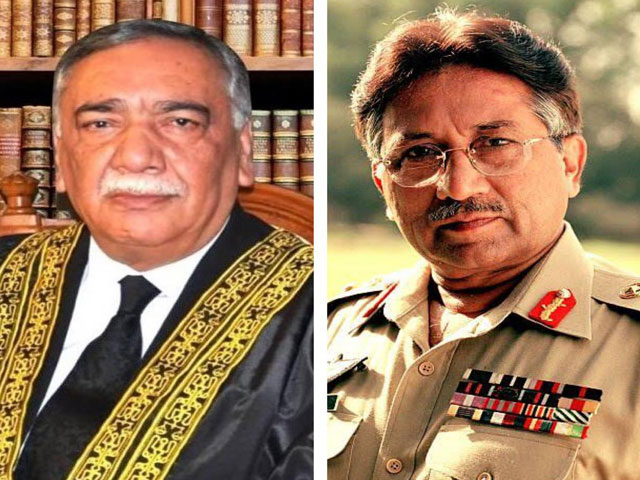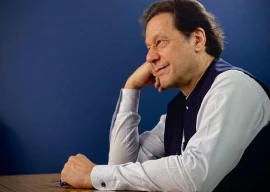
Justice Khosa – who is stepping down on Dec 20 – has handed down several key verdicts against political and judicial functionaries during his tenure, inviting the ire of many but projecting the apex court as a strong institution.
The Musharraf treason case – which was initiated in Nov 2013 by the government of his old foe Nawaz Sharif – had hit frequent delays as special court judges either recused themselves, or retired, or were elevated. “Had it not been for the chief justice, the case might never been decided,” a senior official told The Express Tribune.
According to him, Justice Khosa brought the case back to life. It has been learnt that he was not happy with “undue interference of the high courts” to halt the special court proceedings during the last three weeks.
The Islamabad High Court (IHC), on a petition of the interior ministry, had stopped the special court from announcing its verdict on Nov 28, while directing the government to form a new prosecution team to pursue the case. The Lahore High Court (LHC) is also hearing Musharraf’s petitions against the special court.
On Nov 20, the chief justice had hinted that the case verdict would be announced soon. While addressing a ceremony at the Supreme Court, he said the post-2009 judiciary had convicted one prime minster [Yousuf Raza Gilani], disqualified another [Nawaz Sharif], and was soon going to decide the high treason case against a former army chief [Pervez Musharraf].
Justice Khosa headed the larger bench that had heard the Panama Leaks case in 2017, becoming the first judge to disqualify then-prime minister Nawaz Sharif under Article 62 (1)(f) of the Constitution.
Similarly, he was part of a seven-judge larger bench which had disqualified then-prime minister Yousuf Raza Gilani in the National Reconciliation Order (NRO) case in 2010. He had also written an additional note in the verdict.
Likewise, Justice Khosa had also upheld the death sentence awarded to Mumtaz Qadri, the self-confessed murderer of then-governor Punjab Salman Taseer. He was also part of a special bench which had acquitted Christian woman Aasia Bibi in the blasphemy case.
Of late, a Supreme Court bench – headed by Justice Khosa – gave the government six months to fix the service terms of an army chief through an act of parliament.
On Nov 21, 2014, the three-judge special court – then led by Justice Faisal Arab, – had directed the government to include the names of Shaukat Aziz, Abdul Hameed Dogar, and Zahid Hamid – then PM, CJP and law minister, respectively, as co-accused in the Musharraf treason case. The proceedings were suspended for a couple of years because of the order.
In Feb 2016, the Supreme Court, led by CJP Khosa, had set aside the special court order by directing that the trial against Musharraf be concluded. The court had ruled that only Musharraf should be tried over treason charges for subverting the Constitution in 2007.
In the 11-page order, authored by CJP Khosa, the apex court had observed that a fresh investigation into high treason by associating any person lies within the prerogative of the government and not the special court or the IHC. It had also reproduced all the observations and declarations made by the SC and the Sindh High Court, holding Musharraf solely responsible for the Nov 3, 2007 actions.
The judgment reads that the observations and declarations have already attained finality and they are in public domain. In the meantime, Musharraf had gone abroad for medical treatment.
Soon after taking charge as CJP, Justice Khosa had taken up the matter regarding the delay in Musharraf’s trial.
On March 25, he had referred to the punishment given to English dictator Oliver Cromwell – the Lord Protector of the Commonwealth of England, Scotland, and Ireland – whose skeleton had been hanged after his death, observing that an accused was deliberately not appearing before the trial court and questioning if the court was helpless.
In April, a three-member apex court bench, led by the CJP himself, had directed the special court to proceed under the law by concluding the matter. It had held that, if the accused failed to turn up, he would lose his right to an audience. Following the SC’s decision, the special court resumed hearing.
After the retirement of Justice Tahira Safdar, a special court member, CJP Khosa had nominated Peshawar High Court (PHC) Chief Justice Waqar Ahmad Seth to preside over the special court. He had ensured issuance of notification of Justice Seth’s appointment within two days.
A senior official told that when the notification regarding Justice Seth’s appointment was issued, the powers that be got upset and the government removed the acting law secretary.
Justice Seth had set aside trials of military courts’ convicts, and his judgment had also rescued Pakistan before the International Court of Justice (ICJ) in the case of Indian spy Kulbhushan Jadhav. Recently, Justice Seth had declared unconstitutional the functioning of scores of internment centres in Khyber-Pakhtunkhwa.


1732266251-0/Josh-Brolin-(1)1732266251-0-165x106.webp)
1732266343-0/BeFunky-collage-(82)1732266343-0-165x106.webp)

1732263788-0/BeFunk_§_]__-(30)1732263788-0.jpg)
1732267954-0/Express-Tribune-(6)1732267954-0-270x192.webp)



1732258132-0/BeFunk_§_]__-(26)1732258132-0.jpg)






COMMENTS
Comments are moderated and generally will be posted if they are on-topic and not abusive.
For more information, please see our Comments FAQ